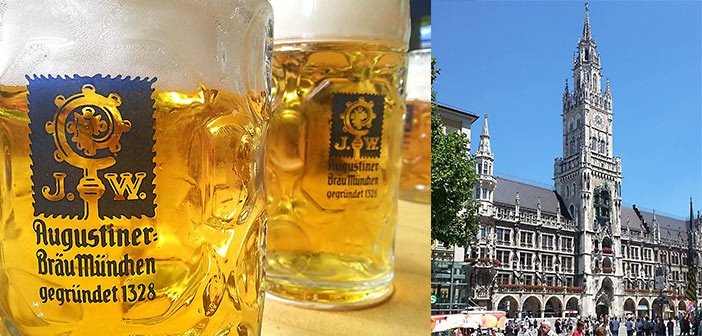For the beer traveller, Munich is the promised city. Take a tour of the city’s epic drinking venues, the Biergartens, which seat thousands, and enjoy authentic German beer culture.
Germans, especially the Bavarian people, love beer. For them beer is not just a drink or a food, but an important part of the whole culture and interaction. Munich’s six large breweries and countless small breweries ensure that the city of 2 million people never goes thirsty.
Germans consider Munich to be the most expensive city in Germany, but for a Finn it is still affordable. A decent male size meal in a restaurant starts at €9 and a pint of lager or Maß 6€8.
Biergarten means open-air restaurant
The German Biergarten, translated as Beer garden, is an open-air restaurant. In Bavaria, Biergartens are usually divided into two sections; in the self-service section you can bring your own snacks, but on the restaurant terrace you have to order all your food from the restaurant. Biergartens can be huge areas, with a capacity for several thousand customers.
Germans’ famous efficiency
How can a Biergarten used by thousands of customers operate with just a few members of staff? The answer is: By thinking efficiently. In a self-service beergarden, the way to buy a beer is to go to the counter to grab the pint you want from the beer counters (which are constantly being poured onto the counter ready for you), then go to a separate cashier to pay for the product. There is a deposit of a couple of euros on the pints, so no empty pints are left on the tables. A thousand customers can be served smoothly with 4-6 employees. There is never a queue.
Here are a few tips for beer tourists in Munich. And once you’ve gone through them, there’s more information to be gleaned from www.munichbeergardens.com
Hofbräuhaus – Munich Beer Institute number 1
Founded in 1589, the Hofbräuhaus brewery restaurant is, in the eyes of the beer tourist, Munich’s the attraction. The entrance to the restaurant is easy to spot, despite its location in the bustling city centre of the city of millions. In front of the door, on the pedestrian street, numerous groups of tourists are ready to rush in as soon as the guide has finished his introductory words.
Despite the tourist crowds, there is always room to get inside the Hofbräuhaus. With 1,300 seats, some on two floors, you’re sure to find a seat at one of the long tables in the house. If the interior looks full, there’s always room in the Biergarten. Dozens of waiters are busily carrying pints of lager and food to the tables. The buzz of chatter and laughter is as loud as a stadium. The noise is accentuated by the occasional brass band performance.
While there are plenty of tourists, the Hofbräuhaus is also home to a good sample of regulars in their feathered hats and leather shorts. Tourist attraction or not – a trip to Munich is not complete without a visit to this house.
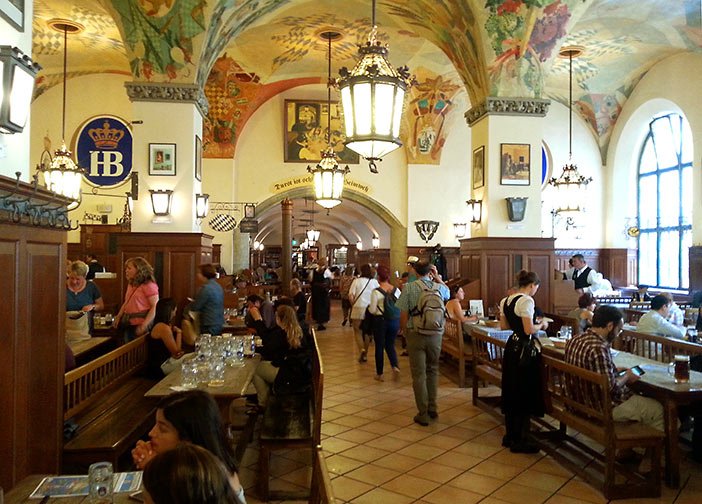



Augustiner Keller – Munich’s favourite
When asked what they think is the best beer place in Munich, the answer is unanimous; Augustiner Keller: “Best beer, best food”. “Keller”, meaning cellar, is misleading as a name. The restaurant itself can seat hundreds of customers and has a modest 5,000-seat beer garden in the courtyard. It’s just outside the old town, so the worst tourist crowds don’t get lost and it remains a genuine teutonic brewery.
The pride of the brewery Augustiner Edelstoff beer is still kept in wooden barrels, giving the beer an excellent clean, smooth taste. You should also try their wheat beer, which is arguably the best of its kind.
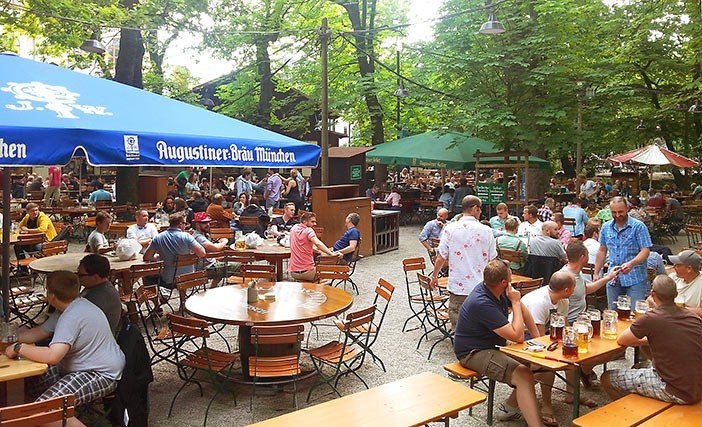
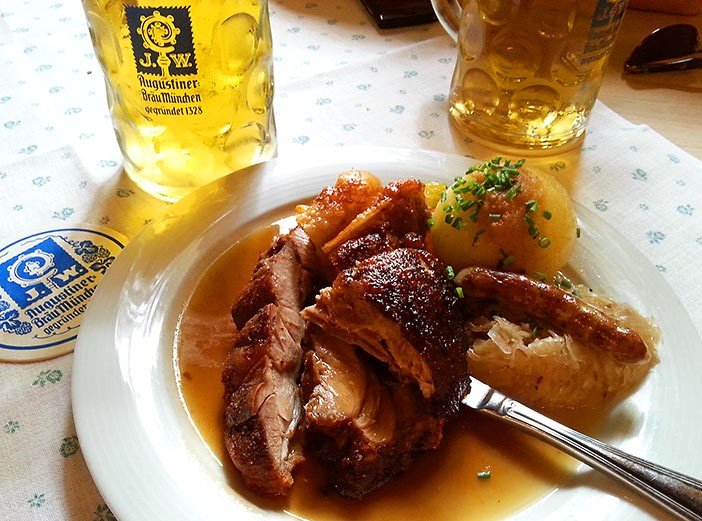
Royal Deer Garden
The world’s largest beer terrace, Hirschgarten, draws 8,000 drinkers to the self-service side and 1,200 to the restaurant terrace. In total, we’re talking hockey stadium-sized crowds drinking and eating together. Hirschgarten shows football on big screens, so if you can’t get a ticket for an FC Bayern Munich game, you should head here. Hirschgarten is a few kilometers from the old town, but it’s easy to get there by train, for example, and taxis in Germany don’t cost much.

Park Cafe – for the finer taste
Sophienstraße 7, 80333 München
Situated on the outskirts of the Old Town, the Park Cafe is a little more sophisticated, offering Hofbräuhaus beers and quality cocktails – often with a DJ pumping music into the buckets. On the food side, try the traditional Flammkuchen (the German version of pizza). The restaurant attracts hundreds of customers to its various halls. The Biergarten is small and intimate in Munich; only 1500 seats…

Muffatwerk – a meeting place for cultural people
On the other side of the river is the Muffatwerk, whose attraction is the former factory building. Bands perform in the hall and you can visit art exhibitions, etc., which are the lifeblood of the cultural crowd. Of course, in Munich, you can’t do anything without beer, so the Muffatwerk also has a small Biergarten for 400 people, where you can enjoy fair food and Hofbräuhaus products. A very happy and friendly bunch. A great atmosphere.
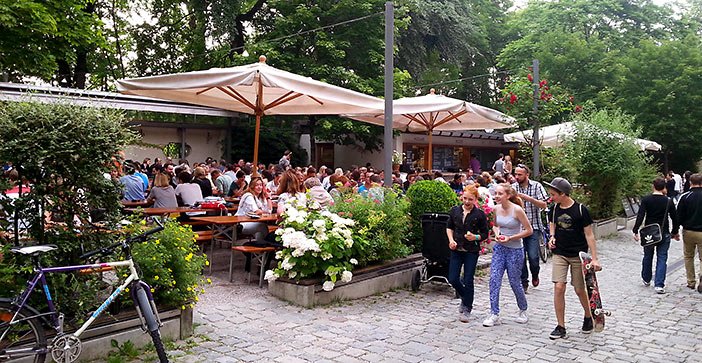
Hofbräukeller – biergarten in the shade of chestnut trees
Innere Wiener Straße 19, 81667 Munich
From the Muffatwerk, just up the river, you’ll find the Hofbraukeller; a restaurant with a few hundred seats and a 1400-seat Beer Garden. What makes the place special is its large chestnut trees, which spread a canopy over the entire terrace. The beer is, as the name suggests, HB and the men’s food is available as long as the terrace is open. There’s also a cocktail bar if, for some strange reason, someone gets tired of beer.
Hofbräukeller is a favourite with families. A large playground has been built for children, where they can spend hours and hours while the adults eat in peace and quiet and have a beer while chatting to each other. So everyone has a good time. And don’t bring Päivi Räsäsäß here to tell us how people should live. It works just fine without her.
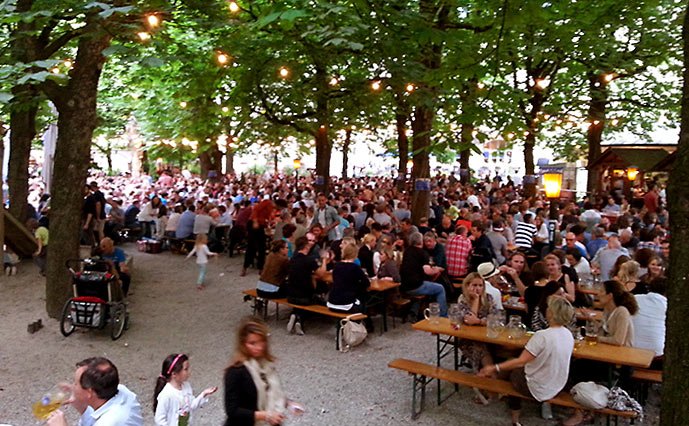
Viktualienmarkt – food and beer from the market
Viktualienmarkt 3, 80331 Munich
Viktualienmarkt is a market area near Marienplatz with sausage stalls and beer taps. You find tables in the middle where you can sit and enjoy the delicacies you find in the market stalls. The tables are not specifically marked for any one stall, but you can sit where there is room.
On Sundays most stalls are closed, but hunger or thirst still wont attack So you can’t buy a glass here and food there. The locals looked on as if they had no brains.
On Sundays most stalls are closed, but hunger or thirst still doesn’t get the better of you. There are a few stalls that keep the market always open. The Viktualienmarkt is also a great place to sample traditional Bavarian dishes.
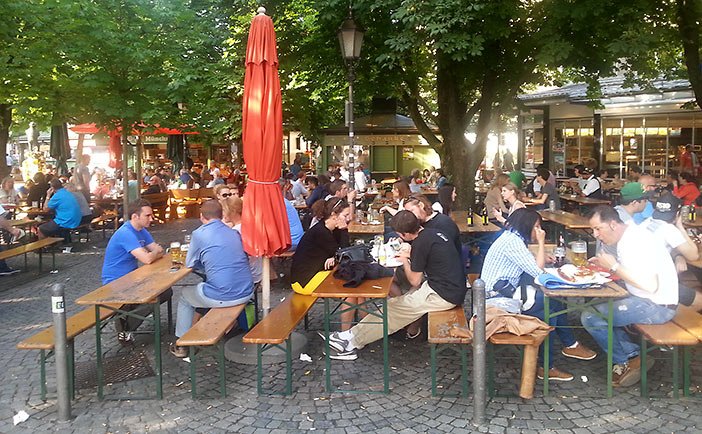
Text and photos: Janne Suomi
This post is also available in:

